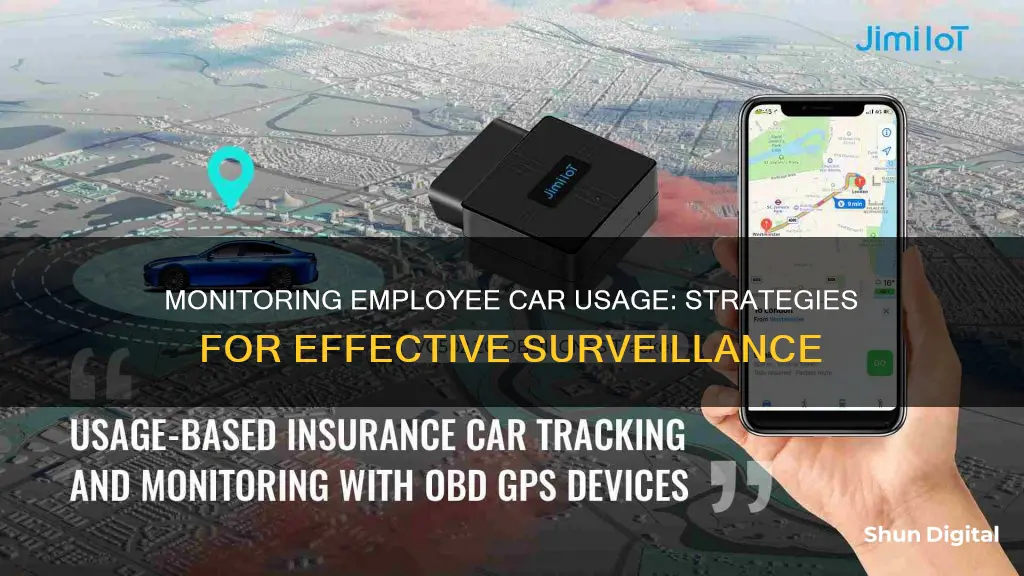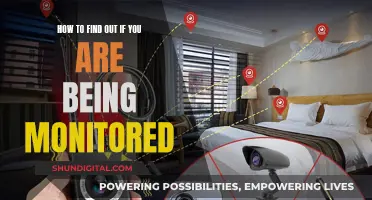
Monitoring employee car usage can be a complex issue, with legal, ethical, and practical considerations to keep in mind. While tracking company vehicles during off-hours can help improve efficiency, brand awareness, and reduce fuel costs, it's important to respect employee privacy and follow data protection regulations. GPS tracking can help optimize routes, improve safety, and cut costs, but it's crucial to have a valid business reason for implementing such monitoring. Employers should also be aware of state and federal laws regarding employee privacy and obtain consent when necessary. Additionally, dash cameras and in-cabin cameras can enhance security, but their use may be seen as overly intrusive. Effective communication and transparency with employees are key to building trust and ensuring understanding of monitoring practices.
| Characteristics | Values |
|---|---|
| Purpose | To improve productivity, optimise management, ensure safety, and cut costs |
| Technology | GPS, telematics systems, dashcams, in-cabin cameras |
| Data Collected | Location, speed, fuel use, accelerator and brake usage frequency, employee whereabouts, driving habits, and other activities |
| Legality | Generally legal, but consent requirements vary by jurisdiction |
| Employee Relations | Transparency and communication are key to maintaining trust and avoiding feelings of invasion of privacy |
What You'll Learn

Using GPS to monitor employee car usage
However, it is important to respect employee privacy rights and be aware of the legal ramifications of implementing GPS tracking. Here are some best practices and considerations for using GPS to monitor employee car usage:
Best Practices for GPS Monitoring:
- Be aware of state laws and regulations regarding privacy expectations and GPS tracking. For example, some states classify attempts to track another person's location with GPS as stalking, while others prohibit installing GPS tracking devices without the owner's consent.
- Have a written GPS tracking policy in place. Outline the business reasons for collecting GPS data, how it will be used, and how employee privacy will be safeguarded. Communicate this policy to all employees and obtain written confirmation of their acknowledgment.
- Limit GPS tracking to company-owned vehicles and devices. Installing GPS on employee-owned vehicles without their permission can lead to legal troubles.
- Only monitor employee behavior during work hours and for specified business objectives. Respect employee privacy outside of work hours.
- Be considerate and transparent with your employees. Explain the benefits of GPS monitoring and address any concerns they may have regarding privacy and data security.
Benefits of GPS Monitoring:
- Increased efficiency: GPS can help optimize routing and deliveries, reducing unnecessary stops and improving productivity.
- Compliance with regulations: Monitoring employee vehicle usage helps ensure compliance with traffic rules, safety regulations, and overtime laws.
- Verification of timesheets: GPS data can be used to verify work hours and compliance with company rules for using company vehicles.
- Protecting brand image: GPS tracking can alert you if vehicles are in locations that could damage your brand image.
- Reducing fuel costs: By monitoring fuel card usage and personal errands, companies can reduce unnecessary fuel expenses.
In conclusion, using GPS to monitor employee car usage can provide significant benefits to businesses, but it must be done responsibly and with respect for employee privacy rights. By following best practices and being transparent with employees, companies can improve efficiency, productivity, and brand protection while also addressing any potential legal concerns.
Monitoring Children's Internet Usage: A Guide for Parents
You may want to see also

Improving productivity and safety with telematics systems
Telematics systems are an effective way to monitor employee car usage and improve productivity and safety. These systems involve using GPS technology, onboard vehicle diagnostics, and other software to collect and analyse data on vehicle operation and usage. This data includes location, speed, fuel use, and even driver behaviour, vehicle diagnostics, and fuel usage patterns.
By using telematics systems, organisations can gain valuable insights that can be used to optimise routes, improve safety, and cut costs. For example, GPS tracking data can help dispatch drivers to customer sites faster and prevent unnecessary stops, increasing productivity and reducing fuel costs. It can also help identify and prevent side jobs, where drivers use company vehicles for personal gain during work hours.
In addition to improving productivity, telematics systems can also enhance brand awareness and protect company assets. With GPS tracking, organisations can monitor their vehicles' locations and be alerted if they are used inappropriately or during unauthorised hours, thus safeguarding their brand image and vehicles.
It is important to note that the implementation of telematics systems for employee car usage monitoring should be done transparently and with clear communication to employees. While it is not always legally required to disclose monitoring practices, it helps build trust and ensure employees understand their rights and how their data is handled.
Furthermore, organisations should be mindful of data protection regulations and ensure that the collection and processing of personal data are lawful, transparent, and for specific purposes. This includes considering the extent to which vehicle tracking is necessary and whether employees reasonably expect such monitoring due to the nature of their work.
Energy Monitoring in Schools: Strategies and Solutions
You may want to see also

Reducing fuel costs with fuel card integration
Integrating fuel cards with GPS tracking is an effective way to reduce fuel costs for your fleet. Fuel card integration provides detailed data on fuel transactions, allowing you to monitor fuel expenses, identify inefficiencies, and prevent fraud. By combining fuel card data with vehicle data, you gain valuable insights that can help you optimise your fleet's fuel usage and reduce costs.
Fuel card integration offers a comprehensive view of your fuel usage by providing detailed transaction data. This data includes information on fuel purchases, locations, and amounts spent. With this data, you can easily identify suspicious transactions and excessive fuel consumption. For example, you can detect instances where employees fill up their personal vehicles or make unauthorised purchases with the company fuel card. Additionally, you can identify vehicles that are not fuel-efficient and take corrective actions.
Fuel card integration also helps prevent fuel card fraud and abuse. By matching fuel card transactions with vehicle locations, you can identify instances where a vehicle was not present during a fuel card purchase. This ensures that fuel cards are only used for legitimate, work-related expenses. Furthermore, fuel card integration enables you to monitor fuel expenses and set benchmarks to achieve fuel savings across your fleet.
Another benefit of fuel card integration is the ability to track fuel trends and spillage. By analysing fuel spent versus fuel purchased, you can quickly identify any discrepancies and take appropriate actions. This helps you optimise your fuel usage and reduce waste. Additionally, fuel card integration provides insights into fuel efficiency by vehicle, allowing you to identify vehicles that require maintenance or have drivers exhibiting undesirable behaviours, such as excessive speeding or idling.
Overall, fuel card integration is a powerful tool for reducing fuel costs. It provides transparency in fuel transactions, helps prevent fraud, and enables you to make data-driven decisions to optimise your fleet's fuel efficiency. By integrating fuel cards with GPS tracking, you gain detailed insights into your fuel usage, which can lead to significant cost savings and improved fleet management.
Hilton's Internet Monitoring: What You Need to Know
You may want to see also

Preventing side jobs and unnecessary stops
Implement GPS Tracking
GPS tracking is a valuable tool for monitoring employee car usage and preventing side jobs and unnecessary stops. By tracking company vehicles during off-hours or personal use, you can improve efficiency, brand awareness, and reduce fuel costs. GPS data will help you identify potential side jobs performed by drivers during work hours or after hours with company vehicles. It will also enable you to dispatch drivers to customer sites faster and put an end to unnecessary stops, such as long lunches.
Remember, GPS tracking is not about invading employees' privacy or showing distrust. Instead, it's a coaching tool to improve productivity, protect company assets, and grow your business. Introducing it as such will help employees understand its purpose and need.
Reduce Fuel Costs with Fuel Card Integration
When company vehicles are used for personal errands, fuel costs can increase significantly. Integrating fuel cards with GPS tracking can help prevent fuel card fraud and reduce overall fuel expenses. Fuel card reporting provides valuable information on where and how often fuel was purchased, helping you identify any misuse.
Avoid Negative Publicity
Company vehicles with your branding are driving billboards for your business. GPS tracking can help ensure these vehicles are not spotted in locations that might reflect poorly on your company's image. You certainly don't want them to be seen in seedy locations, giving you the wrong type of publicity. GPS alerts can notify you when vehicles arrive at certain locations or are moving during unauthorized hours, allowing you to take prompt action to protect your brand image.
Establish Clear Policies
It is essential to have clear and well-defined policies in place regarding vehicle usage, work hours, and breaks. These policies should outline the acceptable use of company vehicles, expectations during work hours, and any consequences for misuse. Employees should be made aware of these policies and provide written acknowledgment to ensure understanding and commitment to adhering to them.
Focus on Coaching
Use the data obtained from GPS tracking as a coaching tool to guide drivers on the appropriate use of company vehicles after hours. This approach will help set clear expectations and ensure everyone is on the same page. Regular reviews of GPS data and open communication will create a culture of accountability and improve overall efficiency.
In summary, preventing side jobs and unnecessary stops while monitoring employee car usage is crucial for maintaining a productive and efficient business. By implementing GPS tracking, integrating fuel cards, establishing clear policies, and focusing on coaching, you can achieve these goals while also protecting your brand image and reducing costs.
Cox Internet Monitoring: What You Need to Know
You may want to see also

Monitoring employee privacy rights
Monitoring employee car usage can help improve efficiency, brand awareness, and decrease fuel costs. However, it is a fine line between monitoring and invading employee privacy. So, it is important to understand the privacy rights of employees and the relevant laws that protect them.
Employee Privacy Rights
In the United States, employee monitoring is completely legal. Federal and state laws allow employers to monitor company-owned devices and track their vehicles. However, there are certain privacy laws in place that protect employee privacy.
The Electronic Communications Privacy Act of 1986 (ECPA) allows employers to monitor employee communications, but only if there is a valid business reason for doing so. While the ECPA does not require employers to disclose monitoring to their employees, some state laws, such as those in Connecticut, Delaware, Texas, and New York, mandate that employers notify their staff about monitoring.
Additionally, the ECPA states that employers can legally look at sent employee emails. However, monitoring must be reasonable, and certain areas, such as bathrooms and locker rooms, are strictly prohibited.
Employers must also be cautious when monitoring employee computer web activity, as they can easily acquire too much information and run afoul of privacy laws like HIPAA. Employers have the burden of protecting sensitive employee information, even if it is obtained from an employee's personal browsing history or private data stored on a company computer.
State-Specific Laws
Some states have more robust privacy laws than others. For example, California, Florida, Louisiana, and South Carolina have constitutions that explicitly state that residents have a right to privacy. As a result, employers in these states must be particularly careful when setting up employee monitoring systems.
Other states, such as New York, require private companies monitoring employees to provide specific notice upon hire and display it in a "conspicuous place" that all employees can see. An acknowledgment of monitoring must also be kept on file for each employee.
Best Practices for Employers
To build trust with employees and ensure legal compliance, employers should follow these best practices:
- Develop a clear policy that outlines the reasons for tracking, the types of data collected, how it will be used, and who will have access to it.
- Educate employees about the policy and address any questions or concerns.
- Obtain consent from employees, especially when tracking personal devices.
- Prioritize data privacy by implementing strong security measures to protect employee data.
- Set limits on tracking, such as avoiding monitoring outside of work hours or for purposes unrelated to the business.
- Stay up-to-date on state and federal laws governing GPS tracking and employee privacy.
By following these practices, employers can respect employee privacy rights while still leveraging the benefits of monitoring employee car usage.
Disabling Android's Permission Usage Monitor: A Step-by-Step Guide
You may want to see also
Frequently asked questions
Yes, in most states, it is legal to monitor company car usage with GPS tracking. However, there are certain risks to privacy rights that need to be considered.
It is important to be transparent about the purpose of monitoring, the types of data collected, how the data will be used, and the rights of the employees in relation to their personal data. Emphasise that the intention is to increase productivity, protect company assets, and improve the business.
Monitoring can help to improve efficiency, brand awareness, and reduce fuel costs. It can also help to prevent side jobs, increase productivity, and protect the company's brand image.







